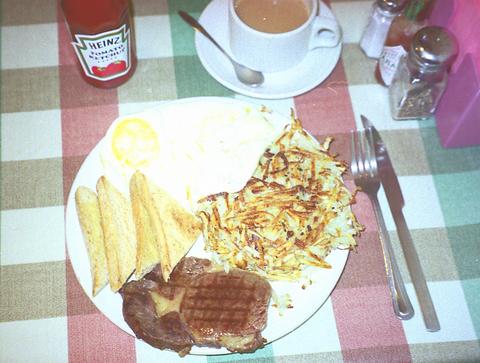Considered by many of its regular patrons to be Taipei's only genuine "greasy spoon," the G'day Cafe has been serving up some of the largest portions of genuine diner-style chow since proprietor and Orchid Island native Barbara Chiang
The G'day Cafe's comfortable dining environment is sparsely decorated. Apart from a couple of photograph montages of customers and several arty mock-ups of traditional Orchid Island fishing boats, there's little for diners to ogle at, which probably explains why the shelves loaded with daily newspapers, comic books and gossip magazines are in such a constant state of disarray.

PHOTO: GAVIN PHIPPS, TAIPEI TIMES
What the G'day Cafe lacks in pretence and decor, however, it more than makes up for it with its food and laid-back attitude.
Unlike many of the city's eating establishments, G'day Cafe operates in a semi-self-service manner, which means diners are spared the ever-too-common problem of an over or under (as is more often the case) zealous waiting staff. Diners are pretty much on their own the moment they walk into G'day Cafe, with soft drinks, including tea and coffee, all self-service and a menu on which patrons simply put a tick beside the meal and hand it to one of the ever-friendly kitchen staff.
It is the hearty breakfasts which have become the joint's trademark dishes. For the mildly hungry, the G'day Cafe's eggs, sausage, bacon and toast (NT$180) should prove adequate, while for those looking to set themselves up for a long day should dig into the ham, bacon and mushroom omelet (NT$180). Diners looking for a mammoth breakfast feast should find the steak, eggs, hash browns and toast (NT$230) combo more than adequate. Additional sustenance such as extra eggs, bacon, toast and hash browns are available and a price range of NT$40 to NT$80.
According to Chiang, some of the joint's other popular dishes, while too numerous to list in full, include the mighty jumbo cheeseburger (NT$170), chimichanga (NT$140), beef enchiladas (NT$230) and the pastrami sub-sandwich (NT$220). Along with the extensive menu, G'day Cafe also offers diners the choice of a daily special lunch which ranges from dishes such as chicken Kiev with mashed potato to macaroni.
While there are only three deserts listed on the menu -- apple pie, blueberry cheesecake and brownie, all of which cost NT$90 -- diners who still find room enough for desert should inquire about other possibilities, such as the apple and berry pie which are not listed on the menu.

June 2 to June 8 Taiwan’s woodcutters believe that if they see even one speck of red in their cooked rice, no matter how small, an accident is going to happen. Peng Chin-tian (彭錦田) swears that this has proven to be true at every stop during his decades-long career in the logging industry. Along with mining, timber harvesting was once considered the most dangerous profession in Taiwan. Not only were mishaps common during all stages of processing, it was difficult to transport the injured to get medical treatment. Many died during the arduous journey. Peng recounts some of his accidents in

“Why does Taiwan identity decline?”a group of researchers lead by University of Nevada political scientist Austin Wang (王宏恩) asked in a recent paper. After all, it is not difficult to explain the rise in Taiwanese identity after the early 1990s. But no model predicted its decline during the 2016-2018 period, they say. After testing various alternative explanations, Wang et al argue that the fall-off in Taiwanese identity during that period is related to voter hedging based on the performance of the Democratic Progressive Party (DPP). Since the DPP is perceived as the guardian of Taiwan identity, when it performs well,

The Taiwan People’s Party (TPP) on May 18 held a rally in Taichung to mark the anniversary of President William Lai’s (賴清德) inauguration on May 20. The title of the rally could be loosely translated to “May 18 recall fraudulent goods” (518退貨ㄌㄨㄚˋ!). Unlike in English, where the terms are the same, “recall” (退貨) in this context refers to product recalls due to damaged, defective or fraudulent merchandise, not the political recalls (罷免) currently dominating the headlines. I attended the rally to determine if the impression was correct that the TPP under party Chairman Huang Kuo-Chang (黃國昌) had little of a

At Computex 2025, Nvidia CEO Jensen Huang (黃仁勳) urged the government to subsidize AI. “All schools in Taiwan must integrate AI into their curricula,” he declared. A few months earlier, he said, “If I were a student today, I’d immediately start using tools like ChatGPT, Gemini Pro and Grok to learn, write and accelerate my thinking.” Huang sees the AI-bullet train leaving the station. And as one of its drivers, he’s worried about youth not getting on board — bad for their careers, and bad for his workforce. As a semiconductor supply-chain powerhouse and AI hub wannabe, Taiwan is seeing